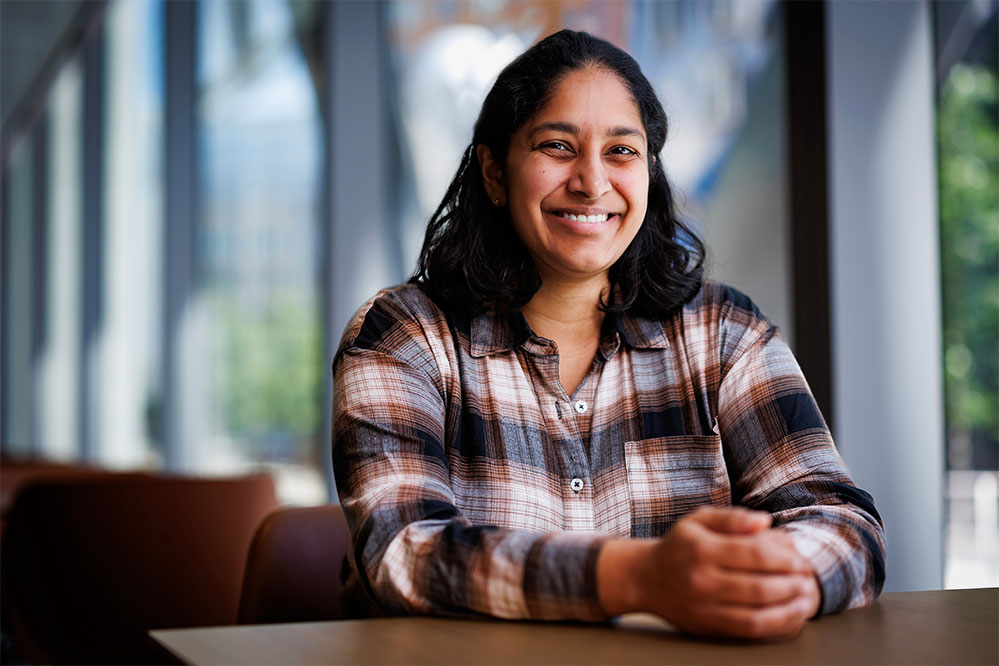For Priya Donti, childhood journeys to India had been greater than a possibility to go to prolonged household. The biennial journeys activated in her a motivation that continues to form her analysis and her instructing.
Contrasting her household residence in Massachusetts, Donti — now the Silverman Household Profession Growth Professor within the MIT Division of Electrical Engineering and Laptop Science (EECS) and a principal investigator on the MIT Laboratory for Data and Resolution Techniques — was struck by the disparities in how individuals stay.
“It was very clear to me the extent to which inequity is a rampant subject all over the world,” Donti says. “From a younger age, I knew that I undoubtedly wished to handle that subject.”
That motivation was additional stoked by a highschool biology trainer, who centered his class on local weather and sustainability.
“We discovered that local weather change, this big, necessary subject, would exacerbate inequity,” Donti says. “That actually caught with me and put a hearth in my stomach.”
So, when Donti enrolled at Harvey Mudd School, she thought she would direct her vitality towards the research of chemistry or supplies science to create next-generation photo voltaic panels.
These plans, nonetheless, had been jilted. Donti “fell in love” with laptop science, after which found work by researchers in the UK who had been arguing that synthetic intelligence and machine studying can be important to assist combine renewables into energy grids.
“It was the primary time I’d seen these two pursuits introduced collectively,” she says. “I bought hooked and have been engaged on that subject ever since.”
Pursuing a PhD at Carnegie Mellon College, Donti was in a position to design her diploma to incorporate laptop science and public coverage. In her analysis, she explored the necessity for basic algorithms and instruments that might handle, at scale, energy grids relying closely on renewables.
“I wished to have a hand in growing these algorithms and power kits by creating new machine studying methods grounded in laptop science,” she says. “However I wished to guarantee that the way in which I used to be doing the work was grounded each within the precise vitality methods area and dealing with individuals in that area” to offer what was truly wanted.
Whereas Donti was engaged on her PhD, she co-founded a nonprofit known as Local weather Change AI. Her goal, she says, was to assist the group of individuals concerned in local weather and sustainability — “be they laptop scientists, lecturers, practitioners, or policymakers” — to come back collectively and entry assets, connection, and training “to assist them alongside that journey.”
“Within the local weather house,” she says, “you want consultants specifically local weather change-related sectors, consultants in several technical and social science device kits, downside homeowners, affected customers, policymakers who know the rules — all of these — to have on-the-ground scalable influence.”
When Donti got here to MIT in September 2023, it was not stunning that she was drawn by its initiatives directing the appliance of laptop science towards society’s largest issues, particularly the present risk to the well being of the planet.
“We’re actually enthusiastic about the place expertise has a a lot longer-horizon influence and the way expertise, society, and coverage all should work collectively,” Donti says. “Expertise isn’t just one-and-done and monetizable within the context of a yr.”
Her work makes use of deep studying fashions to include the physics and exhausting constraints of electrical energy methods that make use of renewables for higher forecasting, optimization, and management.
“Machine studying is already actually extensively used for issues like solar energy forecasting, which is a prerequisite to managing and balancing energy grids,” she says. “My focus is, how do you enhance the algorithms for truly balancing energy grids within the face of a spread of time-varying renewables?”
Amongst Donti’s breakthroughs is a promising resolution for energy grid operators to have the ability to optimize for price, taking into consideration the precise bodily realities of the grid, quite than counting on approximations. Whereas the answer is just not but deployed, it seems to work 10 instances sooner, and much more cheaply, than earlier applied sciences, and has attracted the eye of grid operators.
One other expertise she is growing works to offer knowledge that can be utilized in coaching machine studying methods for energy system optimization. On the whole, a lot knowledge associated to the methods is personal, both as a result of it’s proprietary or due to safety issues. Donti and her analysis group are working to create artificial knowledge and benchmarks that, Donti says, “will help to show a number of the underlying issues” in making energy methods extra environment friendly.
“The query is,” Donti says, “can we carry our datasets to some extent such that they’re simply exhausting sufficient to drive progress?”
For her efforts, Donti has been awarded the U.S. Division of Power Computational Science Graduate Fellowship and the NSF Graduate Analysis Fellowship. She was acknowledged as a part of MIT Expertise Evaluation’s 2021 listing of “35 Innovators Underneath 35” and Vox’s 2023 “Future Good 50.”
Subsequent spring, Donti will co-teach a category known as AI for Local weather Motion with Sara Beery, EECS assistant professor, whose focus is AI for biodiversity and ecosystems, and Abigail Bodner, an assistant professor in Earth, Atmospheric and Planetary Sciences, holding an MIT Schwarzman School of Computing shared place with EECS.
“We’re all super-excited about it,” Donti says.
Coming to MIT, Donti says, “I knew that there can be an ecosystem of people that actually cared, not nearly success metrics like publications and quotation counts, however in regards to the influence of our work on society.”

